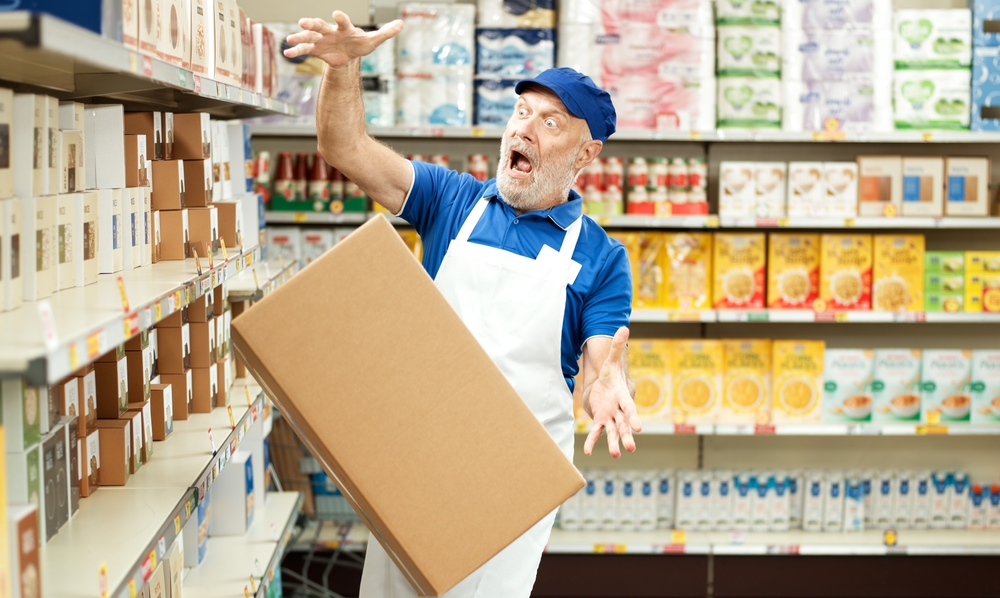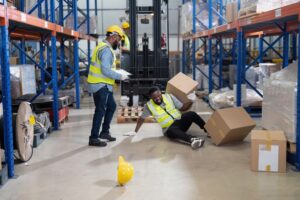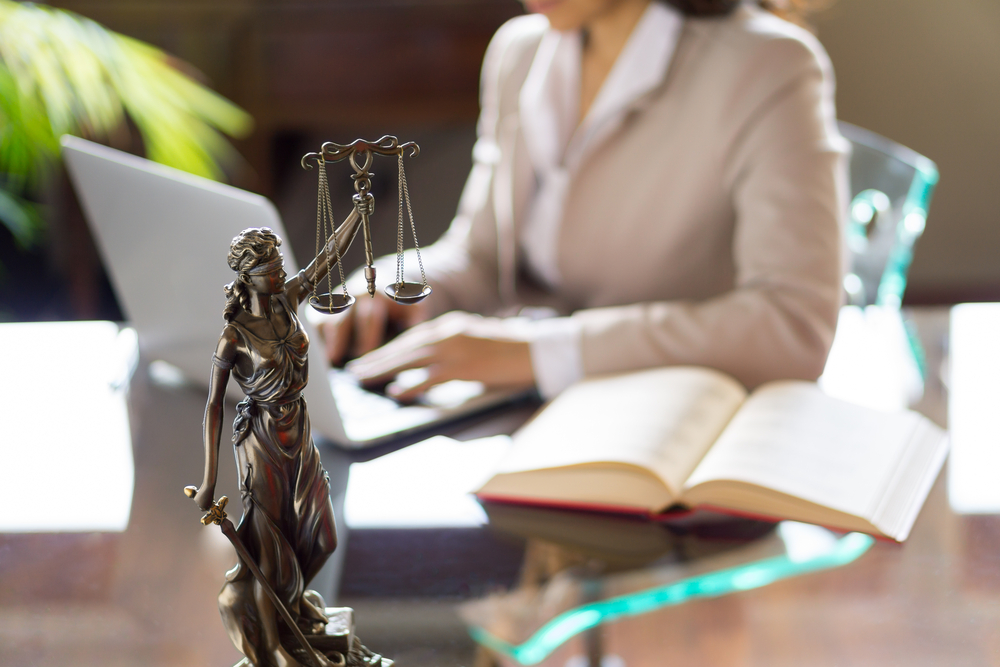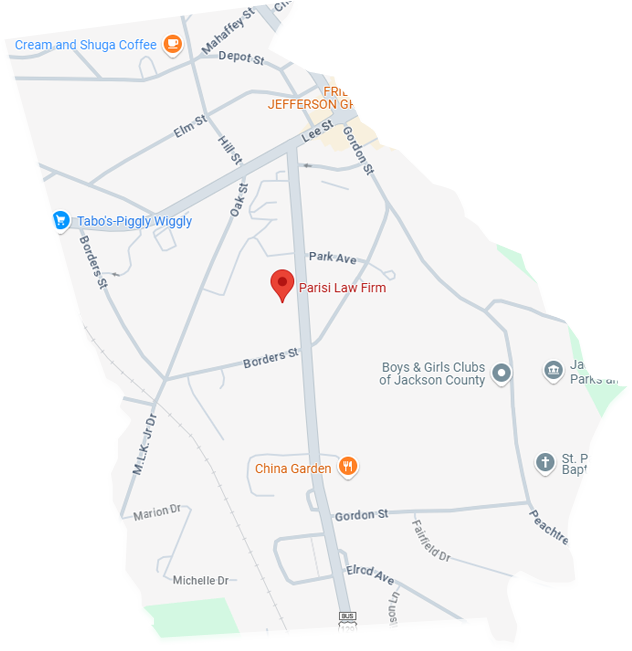A simple trip to a big-box store or local grocery can turn dangerous in an instant. You might be reaching for a product on a shelf when, without warning, an item from above comes crashing down. Injuries from falling merchandise are more common than many people realize, and they can leave victims with serious medical issues and financial burdens. If this has happened to you, it’s important to understand your rights and the concept of falling object liability.
At Parisi Law Firm, we see firsthand how a sudden accident can disrupt a person’s life. These incidents are rarely simple accidents; they often stem from a store’s failure to keep its premises safe for customers. This guide will walk you through what falling object liability means in Georgia, who can be held responsible, and what steps you should take to protect your right to compensation.
Understanding Falling Object Liability in Retail Stores
When you enter a retail store, you have a reasonable expectation of safety. You shouldn’t have to worry about being injured by improperly stacked products or unstable displays. Falling object liability is a legal principle that holds stores accountable when they fail to meet this basic safety standard.
What is falling object liability?
Falling object liability is a type of premises liability claim. Premises liability is the area of law that deals with injuries caused by unsafe or defective conditions on someone else’s property. In the context of a retail store, this means the owner or operator has a legal duty to keep the store reasonably safe for shoppers.
If a store fails in this duty and an object falls and injures a customer, the store can be held legally responsible for the resulting damages. This includes covering medical expenses, lost income, and other related costs. The core of the claim is proving that the store’s negligence—its failure to act with reasonable care—directly caused the injury.
Common causes of falling merchandise accidents
Falling object incidents don’t just happen. They are typically the result of preventable hazards and careless practices. Some of the most frequent causes include:
- Improperly stacked items: Overloading shelves or creating unstable pyramids of products is a common recipe for disaster.
- High shelving: Many large warehouse-style stores stack merchandise high up on industrial shelves. Without proper safeguards, these items can be easily dislodged.
- Unstable displays: Flimsy or poorly constructed promotional displays can collapse under the weight of products.
- Employee error: An employee might drop an item while stocking shelves or retrieving a product for a customer.
- Faulty shelving units: Shelves that are old, damaged, or improperly installed can give way, causing everything on them to fall.
- Customer interference: In some cases, another customer might knock an item off a shelf, which then strikes someone else.
Who Is Responsible for Falling Objects in Stores?
Determining who is at fault is a critical step in any personal injury claim. In falling object cases, the responsibility often lies with the business itself, but it can extend to its employees as well.
Store owner and management responsibility
Ultimately, the responsibility for a safe environment rests with the store’s owner and its management team. They are in charge of creating and enforcing safety policies. This includes procedures for how to stack merchandise, how to inspect for potential hazards, and how to train employees to maintain a safe store. When management cuts corners on safety to save time or money, they create a dangerous environment and can be held liable when accidents happen.
Employee negligence and liability
Store employees are the hands-on representatives of the business. Their actions, or lack thereof, can directly lead to an injury. If an employee improperly stocks a shelf, operates a forklift carelessly, or fails to clean up a known hazard, their negligence can be attributed to their employer. The store is generally responsible for the negligent acts of its employees while they are on the job.
Product stacking and display risks
The way products are displayed is a major factor in store safety. Stores often create large, eye-catching displays to attract customers, but these can pose a significant risk if not built correctly. Heavy items placed on high shelves, top-heavy arrangements, and overcrowded aisles all increase the likelihood of a falling object accident. The store is responsible for ensuring that all its displays and shelving are secure and do not pose a threat to shoppers.
If you were injured by a falling object in a store, you may be entitled to compensation. Contact Parisi Law Firm today for a free, no-obligation consultation to discuss your case.
Proving Negligence in a Falling Object Injury Claim
Just because you were injured in a store does not automatically mean the store is liable. To have a successful claim in Georgia, you must prove that the store was negligent. This involves establishing several key legal elements.
Duty of care in Georgia premises liability law
Under Georgia law, property owners owe a “duty of care” to people they invite onto their property, such as customers in a store. This means they have a legal obligation to exercise ordinary care in keeping the premises and approaches safe. For a falling object case, this duty includes stacking merchandise securely, regularly inspecting for hazards, and warning customers of any known dangers.
To win your case, you must show that the store knew or should have known about the dangerous condition (like an unstable stack of boxes) and did nothing to fix it.
Evidence needed to establish negligence
Proving what a store “should have known” requires strong evidence. Your attorney will work to gather crucial information to build your case, including:
- Incident reports: The official report you file with the store manager is a key piece of evidence.
- Photographs and videos: Pictures of the object that fell, the messy aisle, the shelf it came from, and your injuries are vital.
- Employee records: Maintenance logs, cleaning schedules, and employee training manuals can show a pattern of safety failures.
- Store policies: The store’s own internal rules for stocking and safety can be used to show they failed to follow their own procedures.
The role of surveillance footage and witness statements
Two of the most powerful types of evidence are surveillance video and witness testimony. Nearly every retail store today has security cameras. This footage can provide an unbiased account of how the accident happened, showing exactly what caused the object to fall.
Witnesses—other shoppers or even store employees who saw the accident—can also provide crucial testimony. Their statements can confirm your version of events and help establish that a dangerous condition existed. An experienced attorney knows how to quickly act to preserve this evidence before it is lost or destroyed.
Types of Injuries Caused by Falling Merchandise
An object falling from even a moderate height can generate significant force, leading to severe and sometimes life-altering injuries.
Head, neck, and back injuries
These are among the most common and serious injuries. A blow to the head can cause a concussion or a more severe traumatic brain injury (TBI), leading to long-term cognitive and physical challenges. Impacts to the neck and back can result in herniated discs, whiplash, or even spinal cord damage.
Broken bones and lacerations
Falling cans, boxes, or other hard objects can easily fracture bones in the hands, feet, arms, or shoulders. Sharp or broken items can cause deep cuts (lacerations) that may result in significant bleeding, scarring, and infection.
Long-term health complications
What seems like a minor injury at first can develop into a chronic condition. A concussion could lead to persistent headaches and memory problems. A back injury might result in chronic pain that limits your ability to work or enjoy life. It’s essential to get a full medical evaluation to understand the potential long-term effects of your injuries.
Compensation for Falling Object Injuries in Georgia
If you can prove the store’s negligence caused your injuries, you are entitled to seek compensation for your losses, also known as “damages.” This compensation is intended to make you whole again, covering both your economic and non-economic losses.
Medical bills and rehabilitation costs
This is the most direct financial cost of an injury. Compensation can cover everything from the initial emergency room visit and ambulance ride to surgery, hospital stays, physical therapy, prescription medications, and any future medical care you may need.
Lost wages and future earnings
If your injury forces you to miss work, you can recover those lost wages. If the injury is severe enough to permanently reduce your ability to earn a living or force you into a lower-paying job, you can also seek compensation for this loss of future earning capacity.
Pain, suffering, and emotional distress
Your injuries are more than just a stack of medical bills. Georgia law allows you to seek compensation for the physical pain, emotional trauma, and overall loss of enjoyment of life caused by the accident. This is a critical component of a personal injury claim, and our team at Parisi Law Firm is dedicated to ensuring this suffering is properly valued.
Steps to Take After a Falling Object Accident in a Store
The moments after an accident are chaotic, but the actions you take can significantly impact your ability to recover fair compensation.
Report the incident immediately
Do not leave the store without reporting the accident to a manager. Ask them to create an official incident report and request a copy for your records. This creates an official record of when, where, and how the injury occurred.
Document injuries and the accident scene
If you are able, use your phone to take pictures and videos of everything. Capture the item that fell, the shelf it came from, any warning signs (or lack thereof), and your visible injuries. Get the names and contact information of any witnesses.
Seek medical attention and legal advice
Your health is the top priority. Go to an emergency room or an urgent care clinic right away, even if you think your injuries are minor. Some serious conditions, like brain injuries, may not have immediate symptoms. Then, contact a personal injury lawyer before speaking to any insurance adjusters. An attorney can protect your rights from the start.
Why You Need a Georgia Personal Injury Lawyer
Navigating a premises liability claim against a large retail corporation is not something you should do alone. These companies and their insurance carriers have teams of lawyers dedicated to minimizing or denying claims.
How Parisi Law Firm helps victims of falling object injuries
At Parisi Law Firm, we level the playing field. We are a client-first firm that takes a limited number of cases, allowing us to give your situation the personal attention it deserves. We start by conducting a thorough investigation, gathering all the necessary evidence to build a powerful case on your behalf. We handle all communications, paperwork, and legal deadlines so you can focus on your recovery.
Negotiating with insurance companies
Insurance adjusters are trained to protect their company’s bottom line. They may try to offer a quick, lowball settlement or trick you into saying something that hurts your claim. We have decades of experience negotiating with these companies. We know their tactics and will fight tirelessly to secure a settlement that fully and fairly compensates you for all your losses.
Filing a premises liability lawsuit if necessary
While most cases are settled out of court, we are always prepared to go to trial if the insurance company refuses to make a fair offer. Our reputation as trial-ready attorneys often convinces the other side to negotiate in good faith. We are not afraid to take your case before a judge and jury to fight for the justice you deserve.
If you have been injured by falling merchandise in a Georgia store, don’t wait. Contact Parisi Law Firm for a free consultation to learn how we can help you. We offer free case reviews!







